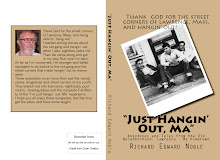 This is a short story from my Book "A Baker's Dozen." to order this book or get more information on this book, click on the cover of the book at the right of this page Thanks.
This is a short story from my Book "A Baker's Dozen." to order this book or get more information on this book, click on the cover of the book at the right of this page Thanks. It was the day before Christmas and all through the house there were long faces, and sad children. My mother had told us that there wouldn't be any Christmas this year. We had no money. Dad was off to sea on the other side of the world somewhere and we were home here in Lawrence ... broke … again.
We had gone up to Broadway hunting for a Christmas tree on several different occasions; but they were all too expensive.
In past years, one could buy a Christmas tree for a quarter or fifty cents. You could buy the best tree on the lot for a dollar – but, not this year. The new president, whoever he was, must have come from the Christmas Tree State; wherever that is. This year Christmas trees sold for dollars. My mom would pick out some diseased little bush, bang it on the sidewalk a few times to watch all the needles fall off, and then ask; "How much for this piece of firewood?"
"Two dollars," the man would say, looking at my mother as if she weren't even worth dealing with.
"Two dollars?" my mother would groan in disbelief, not even covering her voice so that the man couldn't hear.
"Excuse me," the man would say, I have a customer over here. The man would say the word "customer" as to distinguish between my mother and an actual human being with money. A customer was obviously a person who could afford to buy a Christmas tree and not stand there arguing over what the tree might cost. I remember being embarrassed. The way these men treated my mother made me feel even smaller than I was. My mother couldn't have cared less about them. She just seemed to say whatever came into her head. She wasn't concerned about her social status as I was. The men treated her like trash, and she treated them like criminals. My mother was ready for a fight and I was ready to go somewhere and hide.
I would never act like my mother, I thought at the time. I would buy the tree or I wouldn't buy the tree. I guess that I thought that my mother really had the money but she was just too cheap to spend it. She was always trying to save money. A nickel in her pocket was the actual size of a real buffalo. To get one out of her pocket took a whole tribe of Indians and a troop of U.S. cavalry. She was like that on everything, not just Christmas trees. This whole situation was just too, too embarrassing.
We went home, once again, without a Christmas tree.
Now, here it was the day before Christmas and my mother was just sitting there in her chair, knitting another one of her stupid crocheted hats. She knit hats and sweaters and scarves and mittens and gloves. She would even put lace knitting onto linen handkerchiefs. All the relatives said how pretty her hankies were, but I knew better. All this knitted stuff was poor people stuff – the accouterments of poverty. They all smiled, but they weren't really smiling; they were smirking. "Ha ha ha! Look at her! She can't even afford to buy real Christmas presents. Every year it is the same old piece of handmade crap."
"I've got an idea," my mother said. "Why don't you kids go out and sell some of my handmade articles. Instead of sitting there sulking – do something. Every year I get all sorts of compliments. All the relatives love the things that I make. I'll bet that they would sell like hot cakes."
The old woman had to be whacked out of her mind. Not only did she think that her "handmade" stuff was attractive and an "article," she thought that one of us kids would go out into the streets of America and try to sell it. She had obviously read too many "Alice in Wonderland" stories when she was a child.
"Hey! That's a great idea!" my sister said.
I couldn't believe my ears.
Everyone bantered the idea around and they came to what they thought was the obvious conclusion. Richard should go out into the streets of Lawrence on Christmas Eve selling these hats because he was so young and so cute. This was the first time that anyone in the family ever said that they thought that I was cute. I couldn't believe it. They couldn't be serious. On the boldest day of my life I couldn't go up to a stranger and ask the time of day, never mind sell them one of my mother's stupid linen handkerchiefs, made like a doily – all trimmed in pink and blue. This was the wackiest idea that I had ever heard. Sure it sounded great to my brother and sister. I was the dope who would be out there looking like Little Orphan Annie selling crocheted homemade hats door to door. Oh my God!
Within a moment they had me all bundled up and out the kitchen door, carting this little cardboard suitcase filled with stupid hats and doilies. I was beside myself. And it was starting to snow. What would I do?
Well, I couldn't go peddling hats on the very street that I lived. That would be too embarrassing. I would have to walk a block or two and try some street where nobody knew me.
I went up one block and took my first left onto Camden. I stood out in front of this big brown tenement for what seemed like an hour trying to get up my courage. I wanted to cry. I just really wanted to cry. This was so hard. This was the worst thing that had ever happened to me in my entire life.
I walked up the steps that led to the front porch. The door had this gold key thing-a-ma-gig on it. I knew what it was because we had one on our hall door. You turned it clockwise and it rang like a bell. I turned the darn thing. A lady came to the parlor window which looked out onto the front porch. She pulled the lace curtain back and stared down at me for a moment. Then she left.
Next I heard her at the porch door. I was scared out of my wits. I didn't want the lady to see my face, just in case I ever meet her again in my life. I opened up my cardboard suitcase and held it out in front of me with the lid up in front of my face. The lady opened the door and turned on the porch light at the same time. When she looked down into my suitcase with all the multi-colored hats and things she let out with a yelp. I was about to run when I heard her scream; "Oh you guys, you've got to come here and look at this. You won't believe it!"
Yeah, I thought to myself. They won't believe it all right. What won't they believe? They won't believe that there is actually a little boy out here on their stoop on Christmas Eve, selling crocheted hats out of a cardboard box. My god! If anybody finds out about this, I'll die. I'll just have a heart attack and drop dead!
Within just a moment or two there was a cluster of chatty, old women and pretty, young girls all over me. I was pink. I was pink all over my body. I could feel it everywhere. There were women all over me. And they smelled like little flowers and powder puffs and stuff like you smell at the women's counter in Woolworth's department store. Oh man, I think I'm going to be sick – was my feeling. What will happen if I start puking all over this lady's front porch?
They couldn't stand it. They had to drag me into the house and sit me down at the kitchen table while each of them tried on every hat in the box. They actually liked the hats. Who would have believed it? Certainly not I! But you know, I wore some of that knitted stuff that my mother made and no one ever laughed at me. Her stuff looked just like the stuff you could buy at Woolworth's for a pile of money if you wanted to. So there you go.
I sat there watching this gaggle, in disbelief. But yet I had to be cool. It was clear that given the right price they were going to buy some of this crap. But I had to be careful.
"How much is this one?" a girl asked. I pictured myself stating a price; watching them all shrivel up in the face, and then throwing me out of the house. How much was a crocheted hat worth? My mother said that anything above fifty cents would make her happy.
I looked around this lady's apartment. They had good stuff in there. They had a shiny, mahogany, wood kitchen table. Anything that looked dark, pretty, shined and was made of wood was mahogany to me. If anything in a department store looked expensive, my mother would say, "That must be mahogany." I never saw a tree that looked like mahogany. Mahogany must grow in Africa or the South American Amazon Jungle or someplace like that, I thought. Anybody that had mahogany for a kitchen table must be rich, I figured. What would a rich person pay for a homemade, crocheted hat? A crocheted hat couldn't be worth very much, or my mother wouldn't be making them. We didn't have anything in my house that was worth anything. So what could I ask?
I looked at the hat. It was a nice one. She even had it on her head. You have to be rich to just pick something up and put it on your head, I thought. If I ever picked anything up in a department store and put it on my head, my mother would give me a crack that would make my ears ring. This girl had the hat on her head, and she was twisting it this way and that. Nobody would do that unless they were going to buy the darn thing; would they?
"Ahh, that one is seventy-five cents."
"Oh my god! Are you sure?"
O poop, I thought. I blew it. She thinks that seventy-five cents is a lot of money. My mother had to be kidding me with that "anything over fifty-cent" business. But now what could I do? I couldn't change the price. Then they would all know that I was making up the prices. I had to show some confidence. If she put that one back and picked up another one, I could lower the price on that one. Then maybe she would be happy.
"That one is seventy-five cents, but there are others that are..."
"Oh my gosh," she interrupted. "I have to have it, mother." She called her old lady "mother." That was a sure give away. These people had to be rich. The "mother" got out her purse and handed me a dollar.
"I don't have any change," I said.
"Oh don't be silly. That hat is worth a good deal more than a dollar. You take the dollar and when you go home, if your mother says that it costs more than a dollar you come back and I'll give you some more money."
This lady thinks I have a "mother" too. Where the heck in the world was I? I had never seen anybody pay extra for anything in my entire life. These people were wacky. I had stepped through the looking glass. I was now in a world apart. I was only one block from Chelmsford Street and I was into Never-Never Land.
Every hat after the first one went up twenty-five cents. This lady went and got her neighbors. She had a telephone, and was calling people to come over and look.
I had an aunt who had a telephone too. I remember Jack Greco’s dad picking up their new telephone, holding it out a foot in front of his face and yelling at it. “Hold it to your ear Dad,” Jackie told his father. Oh my god, the look on Jackie’s dad’s face when he heard the voice through the receiver for the first time.
My aunt upstairs had a telephone but no one else in our building had one. All the relatives in our building would use her phone and pay her a nickel. But most of the time we had no use for a telephone.
By the time that I left that apartment, I had sold nearly everything in the box, and the last hat I sold for two dollars and fifty cents. I just threw all of the money into the cardboard suitcase. Everybody was happy. All of the teenage girls were running around the apartment with one of my old lady's homemade, crocheted hats on their head. They would turn the brim up in the front and look like a flapper, or pull it over to the side. Some of them even had the hats on backward. At least, I thought they were on backwards, but what did I know.
They were all watching me as I left. I had to be cool. I wanted to scream and start running home, but I couldn't. I had to be cool. I never smiled all the time that I was there. I did my best to look as pathetic as possible. I had to be cute, you know. What the heck was cute anyway? I didn't know anybody who was cute.
I walked leisurely to the corner. As I turned the corner onto Center I peeked over my shoulder. They had closed the porch door, but I could still see them through the parlor window. They weren't watching me.
I felt like a thief. I had just robbed that apartment, but none of them were chasing me. They were all parading around in their hats, looking like Jean Harlow or somebody. When I got around that corner, I ran like hell. Every now and then I leaped into the air. I had never been so excited in all my life. What would my mother and brother and sister think? How would I tell them? Would I run in screaming and jumping around? I felt truly heroic. I had a box full of dollar bills.
By the time I got to our kitchen door, I had calmed down somewhat. I decided that I would play dumb. I would just come in all dejected looking and flop down in a chair without saying anything.
When I walked in the door everybody was disappointed. I hadn't been gone all that long, so naturally they thought that I had just quit. I kept a straight face.
"Well, you didn't give it much of a try," my mother said with a frown.
"Did you go to any houses, or did you just walk around the block and come home?" my sister mumbled.
"No. I came home to get some more hats. You got any more? I'm sold out."
"Ha, ha, ha! You're so funny," my mother spit sarcastically. "I wish you would have at least given it a try. Everybody really likes my hats."
"Yeah, yeah, yeah," I mocked. "Why don't you open the box if you don't believe me?"
"If I don't believe what?"
"If you don't believe that I sold out."
"You sold out?"
"Yeah, I sold out."
"Sure," my sister said, "and why don't you run into the parlor and look at all the presents that Santa left under the Christmas tree."
I just sat there smirking and pointing to the box. My mother began to look at me curiously. Finally she moved towards the box hesitantly. "If you're playing with me, I'm going to give you a smack, I'll tell you."
"Well, get ready to smack him, Mom. There is no way that he could ever have sold all of those hats in such a short period of time. He's just being the little snipe that he always is."
"Oh yeah? Well why don't you open the box then?"
My mother was in front of the box by then. She flipped the little latch and pulled up the lid. Who would have ever believed it? I certainly wouldn't have. It was impossible. But there it was – a suitcase full of money. Jack and the Bean Stalk – but I did it right.
It probably wasn't all that much money, but it was enough to impress everybody in that little apartment. Nobody could believe that I had done it. Everybody's eyes were bugging out of their head. I don't ever remember being prouder than at that moment. I had done the impossible. I don't think that they really thought that I could sell those hats. The place was a sparkle. My mother wanted to give me some of the money, but I wouldn't take it. She wanted me to take some money so that I would go selling hats again in the future. But I knew what I wanted and it wasn't money. I wanted a Christmas tree.
It was Christmas Eve and it was now dark outside. And it was snowing. My mother, my sister and I were all bundled up and heading towards Broadway. We were going to buy a Christmas tree. And when that guy said, “Two dollars,” I'd say, "Good! We'll take it. And here's an extra dollar for you, Merry Christmas." Oh man, wouldn't that be great!
But when we got there, the guy was gone. No Christmas trees anywhere. We walked up and down Broadway. All the Christmas tree stands were gone. Why wouldn't they be gone? Who in their right mind would wait until Christmas Eve to buy a Christmas tree? There we were with a pocket full of money and no tree.
We walked all the way up Broadway to Methuen Square. Then we headed down Lawrence St. along the Searles Castle wall. No more trees for sale anywhere. It was cold. We were blowing into our hands and our noses were running. We had left the house with all our dreams come true. We had gotten the money. We had done the impossible. And now the kingdom was gone for the want of a tree. How could this happen? We could see the trees sparkling in everybody's windows. Most of the houses were lit up with porch lights. But even with a pocket full of money, we would have no Christmas.
Suddenly I saw something in a yard. It looked like Christmas trees lined up along a first floor apartment. But that would be impossible. Why would there be Christmas trees in somebody's yard?
I ran over to the yard and pulled myself up by the rails in order to look over the fence.
"It's Christmas trees, Ma. They're Christmas trees." My sister ran over to the fence and climbed up on a rail beside me. My mother looked and then said; "Well, I'll be." Without hesitating she pulled open the gate and walked right into the yard. There were three Christmas trees leaning there, up against the building. They weren't nice Christmas trees. They were the bottom of the lot. They weren't round or firm or fully packed. They were all ugly, scraggly and filled with empty spaces. But it didn't matter. They were Christmas trees.
My mother marched up the stairs, into the hall, and knocked on the apartment door. She was never one to do that way. The man came to the door and my mother said, "Are those Christmas trees for sale?"
"No," the man said. Our hearts dropped. What could anybody possibly be saving horrible trees like that for? They were all good for nothing. But you know who it was at that door? It was one of those mean guys from the sales lots who wouldn't sell us a tree in the first place. He wasn't going to sell us a tree now because we wouldn't pay the price then, I thought. My old lady was rude to him then, so now he was going to show her who the boss was.
"Those trees are all garbage. They're throw-always."
My mother didn't know what to say. Did the man mean that he would rather throw them away than sell one to cheap people like us?
"Well, if you are just going to throw them away, can we have one then?"
"You can have them all if you want them. I don't care. They ain't worth selling to nobody." Then the man closed the door and went back inside his apartment. He hadn't remembered us. He didn't care one way or another. We eagerly snatched up the trees trying to pick out the best one. But the man was right. Not a one of them was decent enough to make a Christmas tree. They had no limbs on them. My mother stood each tree up, one after another.
"Well, what do you think?" she would ask. She really had a sad look on her face. It was difficult to imagine any of the trees with lights and tinsel on it. How do you decorate a tree with no branches on it? It was easy to see how bad my mother was feeling. It was all her fault, wasn't it? If she would have just bought a tree in the first place, we wouldn't be here now picking through the "garbage."
She had one tree balancing with each of her hands and was spinning them around for our viewing. As she looked at the trees herself, she looked as though she was about to cry. She moved the one tree over to her other hand so that she could pick up the last tree and take a look at it. The last tree wasn't any better. She shook her head negatively. It was a sorry sight. Then she took a last look at the two trees in her other hand. Suddenly her eyes flashed. She pushed the two trees together. The two of them together had enough branches to make one – not very good – tree. She shoved the third one over and bunched them all together. My sister and I beamed. Each tree alone was impossible. But when they were all bunched together they didn't look that bad. We all got the idea. We would take them all home, tie them together and make the three ugly, garbage trees into one real Christmas tree. And we did.
We even had tinsel on the tree because, believe it or not, every year when we took down our Christmas tree at the end of the season, we saved the tinsel. We re-wrapped it, on the cardboard do-hickie, strand by silver strand.
When the relatives came, not a one of them ever noticed that we had three trees tied together by their trunks. We had Christmas presents too. It was just necessary stuff that my mother had bought during the year when it was on sale – like underwear, and socks, but so what.
We each took a turn and went into my mother's bedroom where she had all of this stuff and picked out what we wanted to give to each other. We hid them from one another and wrapped them up in last year's Christmas paper, crossed out the old names on the cards and re-issued them. Merry Christmas - Ho, ho, ho.
And a merry Christmas it was ... really!










































